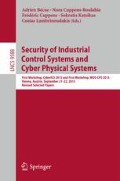Abstract
In the aftermath of Edward Snowden’s intelligence revelations, many governments around the world are increasingly elaborating so-called «digital sovereignty» policies. The declared aim is to develop trusted technologies to protect the more sensitive networks. The ambition of this article is to turn over the complex- and often contrasting- motivations and interests behind the industrial policy movements, explain how the dominant representation of cybersecurity as public good is impacting the public policy and analyse the dynamics between private and public players.
Access this chapter
Tax calculation will be finalised at checkout
Purchases are for personal use only
Notes
- 1.
Some of main references in ecomics of cybersecurity are: Moore, Tyler et al. “The Economics of Online Crime,” Journal of Economic Perspectives, 2009; Anderson, Ross, “Why Information Security is Hard: an Economic Perspective,” Proceedings of the 17th Annual Computer Security Applications Conference, 2001.
- 2.
According to the 2014 German IT Security Report released by Federal Office for Information Security, a cyber-attack that caused significant damage in an steel facility in Germany. For a detailed analysis see Robert M. Lee, ICS Cyber-Attack on German Steelworks Facility and Lessons Learned, 17 December 2014.
- 3.
According to research conducted by US ICS-CERT, in 2012, 197 cyber incidents were reported by asset owners or trusted partners to the US Department of Homeland Security. In 2013, the incidents were 257. Moreover, at every security conference, information technology experts disclose new vulnerabilities and demonstrate how sabotage of ICS got easier.
- 4.
This is the analysis made by the McAfee expert, Jarno Limnéll, NATO’s September Summit Must Confront Cyber Threats, 11 August 2014.
- 5.
According to the 2013 European communication on «Cybersecurity Strategy of the European Union: An Open, Safe and Secure Cyberspace» “there is a risk that Europe not only becomes excessively dependent on ICT produced elsewhere, but also on security solutions developed outside its frontiers”.
- 6.
An in-depth analysis was made by Danielle Kehl, Surveillance Costs: The NSA’s Impact on the Economy, Internet Freedom and Cybersecurity, New America’s Open Technology Institute, 2014.
- 7.
Three are the reference documents: Loi de Programmation Militaire 2014–2019, art. 22.; Programme d’Investissements d’Avenir 2013 – Développement de l’Économie Numérique, «Cœur de filière numérique-Sécurité numérique», Octobre 2013; Le guide pour la qualification de Prestataires d’audit de la sécurité des systèmes d’information (PASSI).
- 8.
The Future of Global Information Security, Gartner Security Scenario Research 2014.
- 9.
For the official declarations see: R. Hannigan, The web is a terrorist’s command-and-control network of choice, The Financial Times, November 3, 2014, and A. Thomson and A. Satariano Silicon Valley Privacy Push Sets Up Arms Race With World’s Spies, Bloomerg, Nov 5, 2014.
References
Floridi, L.: Information: A Very Short Introduction. Oxford University Press, Oxford (2010)
Dunn Cavelty, M.: From cyber-bombs to political fallout: threat representations with an impact in the cyber-security discourse. Int. Stud. Rev. 15(1), 105–122 (2013). Friedman, A.: Economic and Policy Framework for Cybersecurity Risks. Brookings, July 2011
Lacoste, Y.: La géographie ça sert d’abord à faire la guerre. La découverte, Paris (2014)
Rid, T.: Cyberwar Will Not Take Place. Oxford University Press, Oxford (2013)
Castelluccia, C., Grumbach, S., Olejnik, L.: Data Harvesting 2.0: from the Visible to the Invisible Web. Presented at the 12th Workshop on the Economics of Information Security, Washington, DC, United States, June 2013. https://who.rocq.inria.fr/…/WEIS13-CGO.pdf
Anderson, R.: Privacy versus government surveillance: where network effects meet public choice. Presented at the 13th Workshop on the Economics of Information Security, Pennsylvania State University, United States, June 2014. http://weis2014.econinfosec.org/papers/Anderson-WEIS2014.pdf
Hill, J.F.: The Growth of Data Localization Post-Snowden: Analysis and Recommendations for U.S. Policymakers and Industry Leaders. Lawfare Research Paper Series, vol. 2–3 (2014)
Maurer, T., Morgus, R., Skierka, I., Hohmann, M.: Technological sovereignty: missing the point? In: An Analysis of European Proposals after 5 June 2013
White Paper on Defence and National Security, La documentation Fransaise, Paris, p. 174 (2008)
D’Elia, D.: Public-private partnership: the missing factor in the resilience equation. The French experience on CIIP. In: Stefanowski, J., Panayiotou, C.G., Ellinas, G., Kyriakides, E. (eds.) CRITIS 2014. LNCS, vol. 8985, pp. 193–199. Springer, Heidelberg (2016). doi:10.1007/978-3-319-31664-2_20
Omand, D.: Securing the State. Hurst, London (2010)
Floridi, L.: The Online Manifesto, Being Human in a Hyperconnected Era. Springer, Berlin (2015)
Schneier, B.: A Fraying of the Public/Private Surveillance Partnership. https://www.schneier.com/blog/archives/2013/11/a_fraying_of_th.html. Accessed 30 November 2013, The Battle for Power on the Internet, The Atlantic. http://www.theatlantic.com
Acknowledgements
This work is funded by Airbus Defense and Space-CyberSecurity and supported by the Chaire Castex de Cyberstratégie. Any opinions, findings, and conclusions or recommendations expressed in this publication are those of the author and do not necessarily reflect the views of Airbus.
Author information
Authors and Affiliations
Corresponding author
Editor information
Editors and Affiliations
Rights and permissions
Copyright information
© 2016 Springer International Publishing Switzerland
About this paper
Cite this paper
D’Elia, D. (2016). The Economics of Cybersecurity: From the Public Good to the Revenge of the Industry. In: Bécue, A., Cuppens-Boulahia, N., Cuppens, F., Katsikas, S., Lambrinoudakis, C. (eds) Security of Industrial Control Systems and Cyber Physical Systems. CyberICS WOS-CPS 2015 2015. Lecture Notes in Computer Science(), vol 9588. Springer, Cham. https://doi.org/10.1007/978-3-319-40385-4_1
Download citation
DOI: https://doi.org/10.1007/978-3-319-40385-4_1
Published:
Publisher Name: Springer, Cham
Print ISBN: 978-3-319-40384-7
Online ISBN: 978-3-319-40385-4
eBook Packages: Computer ScienceComputer Science (R0)

